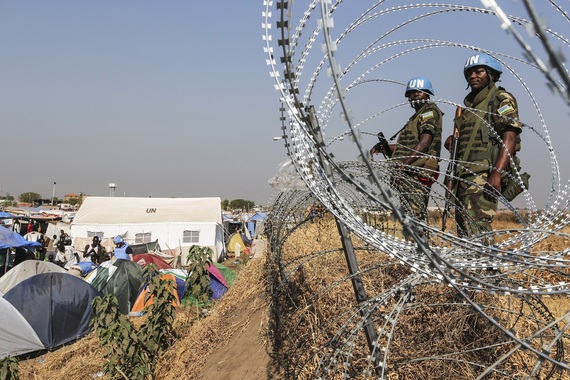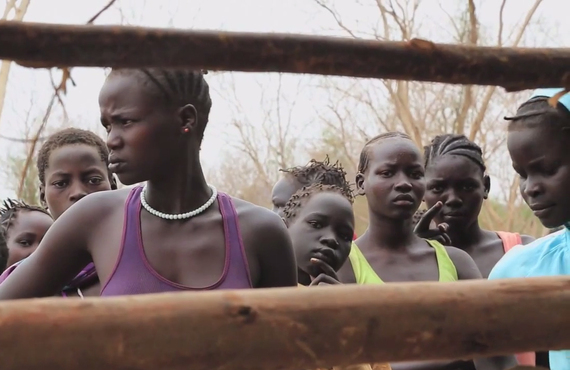The eyes of the world are now on South Sudan. The devastating crisis in the country is well into its fifth month, and there is no letup in sight to the hostilities that have claimed the lives of thousands and displaced over a million people. A looming humanitarian disaster in the world's youngest nation-state has placed South Sudan at risk of suffering one of the African continent's worst famines since the 1980s. And only last month the world was horrified by the wanton slaughter of civilians on the basis of their ethnicity in two state capitals. World leaders are now descending on South Sudan, urging the two belligerent leaders to stop fighting.
With United Nations Secretary General Ban Ki-moon's engagement with both leaders during his visit to South Sudan this week, it was clear to both parties that they now must meet and speed up the process to sort out their differences. It is our hope that the meeting in Addis tomorrow between President Salva Kiir Mayardit and leader of the opposition forces, Riek Machar Teny, will yield results.
This is critical for the millions of suffering South Sudanese, including the thousands under UN protection. Despite numerous challenges, the United Nations peacekeeping Mission in South Sudan (UNMISS) and the humanitarian organizations have protected tens of thousands of civilians facing an imminent threat of physical violence. From the onset of the crisis on the morning of December 16, 2013, when thousands of people came to the UNMISS compound in Juba in search of shelter and succor, the Mission has granted entry to all unarmed civilians regardless of their creed, ethnic group or political affiliation. The Mission did the same in 11 other UN compounds around the country which are currently hosting over 79,000 displaced people who still fear to go back home.
Never in the 69-year history of the United Nations has a peacekeeping mission given protection to such large numbers of people and for such an extended period of time. It is no exaggeration to state that the decision to throw open the Mission's compound gates to these civilians helped avert a massive bloodbath of unimaginable proportions. The Mission also continues to investigate credible accounts of extra-judicial executions, ethnically targeted violence against civilians, sexual violence against women and other atrocities. And by supporting humanitarian partners, UNMISS has played a critical role in facilitating the delivery of urgently needed humanitarian aid to hundreds of thousands of people.
These achievements of UNMISS and the United Nations family in South Sudan are all the more remarkable considering the extremely challenging conditions they currently face. The Mission's operations and the supply of life-saving humanitarian aid are being constantly hampered by both belligerent parties. The UN is in harm's way on a daily basis. Without such impediments, the Mission and the wider United Nations family would be able to serve and protect far more civilians. Indeed, the challenges the Mission is facing are immense and of a scale and scope it was never designed to cope with. Obstruction of the Mission's operations and of humanitarian work in South Sudan must stop immediately.
The escalation in fighting in the last few weeks is making our tasks all the more difficult. On April 17, a mob of about 300 people with concealed weapons and posing as protestors seeking to present a petition attacked the protection-of-civilians site inside our compound near the town of Bor where some 5,000 displaced civilians are housed. Forty-eight civilians tragically died in this abhorrent attack. UNMISS peacekeepers took action. They fought back, returned fire, and repelled the attackers, saving numerous lives. Without the determined protection of UNMISS, hundreds if not thousands would have been slaughtered in this attack.
In another appalling case two days earlier, hundreds of civilians were massacred after opposition forces recaptured the town of Bentiu. There again, the Mission opened up its compound to the north of the town, and within a matter of days the number of its civilians under its protection nearly tripled, from around 8,000 to approximately 22,500 in that base. The Mission's peacekeepers also drove into Bentiu that same day to rescue hundreds of trapped civilians and escorted them to safety at the UNMISS base. Yet again, without the Mission's intervention the death toll would have been much higher.
The events in Bor and Bentiu did not trigger an exodus out of any of these camps. There can be no better testament to the safety and security provided by UNMISS than the decision of tens of thousands of South Sudanese civilians to continue to seek UN protection in those bases. They are still regarded as the safest places to seek refuge in the country.
To be sure, conditions in the camps are tough and far from ideal. Keeping them safe and secure is a daunting task. The UN is in a rush against time to improve conditions for the rainy season, which brings with it a grave threat of waterborne diseases. An overstretched and under-resourced Mission is doing its best, together with the whole family of UN agencies and humanitarian partners, to provide vital assistance to South Sudanese in need.
Ultimately, though, the UN cannot save South Sudan from itself and cannot protect each and every civilian in this vast country. The primary responsibility for protecting the civilian population of South Sudan will always rest with the government and its security services. The opposition forces too have the full responsibility to protect civilians and comply with international humanitarian law.
Furthermore, the leaders in government and in opposition must realize that violence will only deepen the suffering of all South Sudanese. Any military victory is totally illusory, its singular result leaving the country and millions of people in complete ruin. The violence must stop immediately. Only a negotiated peace will ensure a sustainable future for South Sudan.
Today, the country is at a tipping point. The most recent events in Bor and Bentiu are alarming. They bear all the troubling signs of a country drifting into a dangerous polarization of the conflict along ethnic lines which is about to spin out of control. The only way to stop the country from plunging into the abyss is to immediately halt the fighting, respect the cessation of hostilities agreement signed by both parties last January and find a political solution to the conflict in utmost urgency.
Tomorrow, the leaders of South Sudan have a unique opportunity to live up to the responsibility towards the people of their country and to end the senseless fighting that has cost the lives of so many. Only in this way can the dark pages in South Sudan's history be turned. Only in this way can the world's newest nation and its proud and resilient people face a brighter tomorrow.
Hilde F. Johnson is the Special Representative of the Secretary General and Head of the UN Mission in South Sudan. Renowned actor Sean Penn has been engaged in many countries in crisis, and he visited South Sudan in April 2014.
Find out more at www.unmiss.unmissions.org and www.un.org/peacekeeping

